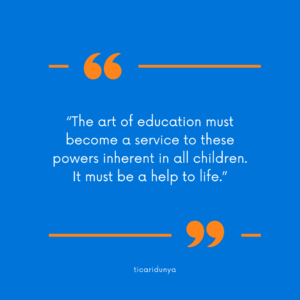Amidst the flux of modern educational theories, the enduring principles of Maria Montessori continue to shine. Her collection of insightful quotes offers not just kernels of wisdom but a panoramic view into her game-changing philosophies on education and child development. So, what is it that gives her words such lasting relevance? Join us as we explore a curated anthology of Maria Montessori quotes, organized under four pivotal themes: Education & Teaching, Child Development & Behavior, Nature & Environment, and Miscellaneous Wisdom.
Maria Montessori Quotes on Education & Teaching: Nurturing Minds, Building Futures
Maria Montessori saw education as more than just a transmission of knowledge. She viewed it as an intricate tapestry, carefully woven with hands-on experiences, environmental influences, and the teacher’s role as a guide rather than a commander.
“Education is a natural process carried out by the child and is not acquired by listening to words but by experiences in the environment.”
The Role of Teachers: A Different Perspective
So, what should be the role of teachers according to Montessori? Her quotes speak of a teacher who is essentially a facilitator, a sideline observer who sets the stage for the child to explore and learn.
“The greatest sign of success for a teacher is to be able to say, ‘The children are now working as if I did not exist.'”
Education and Peace: The Unbreakable Bond
It’s hard to talk about Montessori’s philosophy without mentioning her strong belief in the relationship between education and peace. Maria Montessori saw education as a tool not just for individual development, but for societal transformation.
“Establishing lasting peace is the work of education; all politics can do is keep us out of war.”
- Importance of Reform in Education
- “There is not just a need for happier schools, schools where the children are free to do as they like or schools where they use certain materials: education today needs reform. If education is to prepare man for the present, and the immediate future, he will need a new orientation towards the environment.”
- Maria Montessori, The 1946 London Lectures, p. 102
- Adaptation and Education
- “We must accept adaptation as the basis upon which we can build a concept of education.”
- Maria Montessori, The 1946 London Lectures, p. 96
- Intellectual and Moral Development
- “Language is related to the development of intelligence, but moral development is very important too. Intellectual education and moral and social education are the two sides of development.”
- Maria Montessori, The 1946 London Lectures, p. 90
- Creating an Attractive Environment
- “In our plan for the education of little children, we must create an attractive environment. Into this environment, we must put everything that is good for the mind, along with an understanding and affectionate person.”
- Maria Montessori, The 1946 London Lectures, p. 119
- Purpose of Education
- “The real purpose of education is to prepare the orientation for future generations, who will progress to a new plane.”
- Maria Montessori, The 1946 London Lectures, p. 102
- Early Education
- “People start educating children when they are capable of understanding: they only educate the conscious mind. They say that children under five are incapable of benefiting from education because they do not understand enough.”
- Maria Montessori, The 1946 London Lectures, p. 77
- Motor and Physical Activity
- “When there is motor and physical activity, you can see a more important kind of education, a kind of education that takes the force of life into account.”
- Maria Montessori, The 1946 London Lectures, p. 77
- Understanding Child Development
- “If education is to be based on what we know of little children, we must first understand their development.”
- Maria Montessori, The 1946 London Lectures, p. 42
- Education from Birth
- “Certainly it is a new task that confronts us, to study and take into account the needs of this absorbent mind. It is to respond to these needs that we say, ‘Education must begin at birth’.”
- Maria Montessori, The 1946 London Lectures, p. 67
- Psychological Development
- “Education must begin from birth. It must understand the psychological development of man. It must know of the great psychic energy of man.”
- Maria Montessori, The 1946 London Lectures, p. 40

15 Profound Quotes on Education & Teaching
- “Education today needs reform. If education is to prepare man for the present, and the immediate future, he will need a new orientation towards the environment.” – Maria Montessori, The 1946 London Lectures, p. 102
- “In order to study the question of adaptation, it is necessary to study the environment.” – Maria Montessori, The 1946 London Lectures, p. 96
- “Language is related to the development of intelligence, but moral development is very important too.” – Maria Montessori, The 1946 London Lectures, p. 90
- “In our plan for the education of little children we must create an attractive environment.” – Maria Montessori, The 1946 London Lectures, p. 119
- “The real purpose of education is to prepare the orientation for future generations.” – Maria Montessori, The 1946 London Lectures, p. 102
- “People start educating children when they are capable of understanding: they only educate the conscious mind.” – Maria Montessori, The 1946 London Lectures, p. 77
- “When there is motor and physical activity, you can see a more important kind of education.” – Maria Montessori, The 1946 London Lectures, p. 77
- “If education is to be based on what we know of little children, we must first understand their development.” – Maria Montessori, The 1946 London Lectures, p. 42
- “Education must begin from birth. It must understand the psychological development of man.” – Maria Montessori, The 1946 London Lectures, p. 40
- “The art of education must become a service to these powers inherent in all children.” – Maria Montessori, The 1946 London Lectures, p. 38
- “The purpose of education must be to elevate the individual; otherwise education would be of no use.” – Maria Montessori, The 1946 London Lectures, p. 31
- “Before we can give help, we must understand; we must follow the path from childhood to adulthood.” – Maria Montessori, The 1946 London Lectures, p. 28
- “Education is the help we must give to life so that it may develop in the greatness of its powers.” – Maria Montessori, The 1946 London Lectures, p. 28
- “In these times, more than ever before, our hope is that education will offer an aid to better the condition of the world.” – Maria Montessori, The 1946 London Lectures, p. 24
- “Teachers should cultivate a staunch belief in their mission. Only then will it be possible to create a new world through education.” – Maria Montessori, Citizen of the World, p. 98
These quotes touch on various aspects of Montessori education, from the importance of a conducive environment to the need for a holistic approach that includes both intellectual and moral development.

Maria Montessori Quotes on Child Development & Behavior: The Symphony of Growth
The Miraculous Child
Montessori’s respect for the individual child comes through vividly in her quotes. Her belief that each child is a unique entity is a cornerstone of her educational philosophy.
“The child is truly a miraculous being, and this should be felt deeply by the educator.”
Community and Discipline: Two Sides of the Same Coin
Montessori placed a strong emphasis on the role of community in a child’s upbringing.
“The child, making use of all that he finds around him, shapes himself for the future.”
As for discipline, Montessori took a fresh perspective. According to her:
“Discipline must come through liberty… We do not consider an individual disciplined only when he has been rendered as artificially silent as a mute and as immovable as a paralytic.”
Planes of Development: Understanding the Phases
In Montessori’s philosophy, understanding a child’s planes of development is key.
“When dealing with children there is greater need for observing than of probing.”
Montessori Wisdom: 15 Profound Quotes on Child Development
“The greatest sign of success for a teacher is to be able to say, ‘The children are now working as if I did not exist.'”
– Maria Montessori, The Absorbent Mind“The environment must be rich in motives which lend interest to activity and invite the child to conduct his own experiences.”
– Maria Montessori, The Montessori Method“The child is both a hope and a promise for mankind.”
– Maria Montessori, Education and Peace“The first essential for the child’s development is concentration. The child who concentrates is immensely happy.”
– Maria Montessori, The Absorbent Mind“The goal of early childhood education should be to activate the child’s own natural desire to learn.”
– Maria Montessori, The Discovery of the Child“The child should live in an environment of beauty.”
– Maria Montessori, The Secret of Childhood“The most important period of life is not the age of university studies, but the first one, the period from birth to the age of six.”
– Maria Montessori, The Absorbent Mind“The hands are the instruments of man’s intelligence.”
– Maria Montessori, The 1913 Rome Lectures“The greatest gifts we can give our children are the roots of responsibility and the wings of independence.”
– Maria Montessori, The Montessori Method“Never help a child with a task at which he feels he can succeed.”
– Maria Montessori, The Montessori Elementary Material“The child is capable of developing and giving us tangible proof of the possibility of a better humanity.”
– Maria Montessori, Education for a New World“The child who has felt a strong love for his surroundings and for all living creatures, who has discovered joy and enthusiasm in work, gives us reason to hope that humanity can develop in a new direction.”
– Maria Montessori, From Childhood to Adolescence“The child is the father of the man.”
– Maria Montessori, The Montessori Method“The teacher must derive not only the capacity but the desire, to observe natural phenomena. The teacher must understand and feel her position of observer: the activity must lie in the phenomenon.”
– Maria Montessori, The Montessori Method“One test of the correctness of educational procedure is the happiness of the child.”
– Maria Montessori, The Discovery of the Child
Montessori Quotes on Nature & Environment: The Earth as an Extended Classroom
A Deep Connection to Nature
Montessori believed that the natural world was a powerful educator.
“The land is where our roots are. The children must be taught to feel and live in harmony with the Earth.”
The Importance of the Prepared Environment
Environment plays a vital role in a child’s development, and Montessori placed great emphasis on the “prepared environment.”
“The environment must be rich in motives which lend interest to activity and invite the child to conduct his own experiences.”

15 Profound Quotes on Child Nature & Environment
- “The land is where our roots are. The children must be taught to feel and live in harmony with the Earth.”
- Maria Montessori, From Childhood to Adolescence
- “Plainly, the environment must be a living one, directed by a higher intelligence, arranged by an adult who is prepared for his mission.”
- Maria Montessori, The Absorbent Mind
- “The first essential for the child’s development is concentration. The child who concentrates is immensely happy.”
- Maria Montessori, The Absorbent Mind
- “The child is both a hope and a promise for mankind.”
- Maria Montessori, Education and Peace
- “The child is an observer, and it is often difficult to realize how much he sees and hears. What is clear is that the child learns more easily during his first few years than at any other time in life, when he is an adult.”
- Maria Montessori, The Secret of Childhood
- “The child should live in an environment of beauty.”
- Maria Montessori, The Montessori Method
- “The child can only develop fully by means of experience in his environment. We call such experience work.”
- Maria Montessori, The Absorbent Mind
- “The child who has felt a strong love for his surroundings and for all living creatures, who has discovered joy and enthusiasm in work, gives us reason to hope that humanity can develop in a new direction.”
- Maria Montessori, From Childhood to Adolescence
- “The development of language comes naturally, like the leaves to a tree.”
- Maria Montessori, The Montessori Method
- “The environment must be rich in motives which lend interest to activity and invite the child to conduct his own experiences.”
- Maria Montessori, The Absorbent Mind
- “The greatest sign of success for a teacher is to be able to say, ‘The children are now working as if I did not exist.'”
- Maria Montessori, The Absorbent Mind
- “The most important period of life is not the age of university studies, but the first one, the period from birth to the age of six.”
- Maria Montessori, The Absorbent Mind
- “The study of love and its utilization will lead us to the source from which it springs, the Child.”
- Maria Montessori, The Secret of Childhood
- “We shall walk together on this path of life, for all things are part of the universe and are connected with each other to form one whole unity.”
- Maria Montessori, To Educate the Human Potential
- “Within the child lies the fate of the future.”
- Maria Montessori, The Secret of Childhood
Montessori’s Miscellaneous Wisdom: A Peek into the Mind of a Maverick
Practical Life Skills: More than Just ABCs
Maria Montessori didn’t limit education to academic pursuits; she wanted children to learn life skills too.
“The hands are the instruments of man’s intelligence.”
Art and Creativity: Unleashing Inner Potentials
When it came to creativity, Montessori had a unique perspective. She said:
“The essential thing is to arouse such an interest that it engages the child’s whole personality.”
From practical life skills to her thoughts on peace, Montessori’s quotes cover a wide spectrum of life’s aspects. As we continue to seek out innovative ways to educate and raise children, her wisdom remains a constant guidepost, helping us navigate through the complexities of education and human development.
As you ponder these thought-provoking quotes from Maria Montessori, may they enlighten your path—whether you’re an educator, a parent, or simply a lifelong learner.


